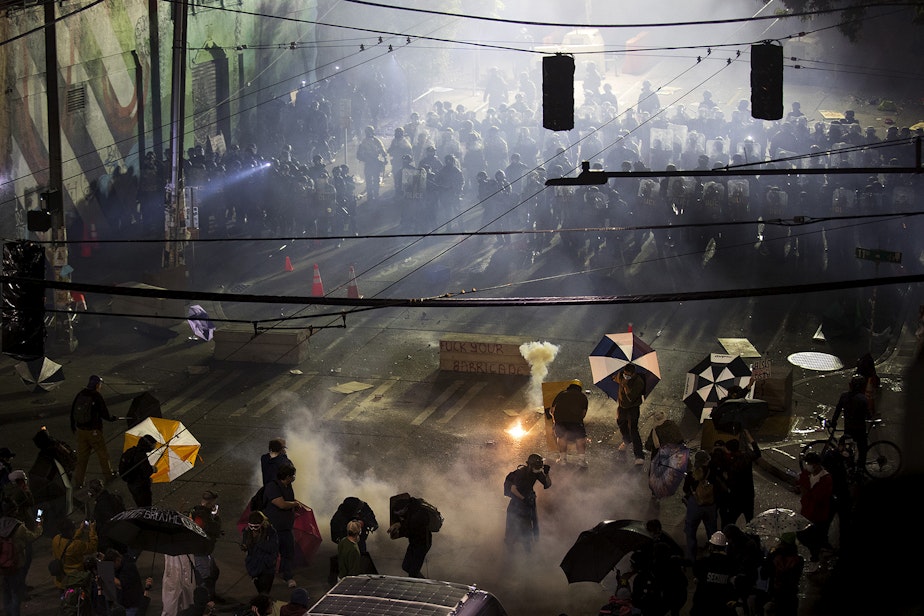Federal judge rejects attempt to enforce Seattle crowd weapons ban in lawsuit over protesters' protective gear

A federal judge on Monday denied a motion seeking an outright ban on the Seattle Police Department's use of crowd control weapons.
The request was filed in the U.S. District Court for the Western District of Washington as part of a lawsuit arguing that protesters are being priced out of their constitutional rights by an increasing need to wear protective gear to ongoing civil rights demonstrations.
The lawsuit contends that the Seattle Police Department's repeated use of munitions against demonstrators is a violation of their First Amendment right to peaceably assemble — an argument that has come up frequently during the course of an ongoing battle to rein in the department's use of "less lethal" crowd control weapons.
But the filing also presented a more novel argument: The City of Seattle had established a "de facto protest tax," because demonstrators "now must purchase cost-prohibitive gear to withstand munitions," contravening their right to equal protection under the law.
"You shouldn't have to be rich to be able to air your grievances via your First Amendment rights," said Talitha Hazelton, the attorney representing the plaintiffs in the case.
RELATED: Needing body armor to protest in Seattle violates constitutional rights, lawsuit argues
Judge Richard Jones, however, denied Hazelton's motion for a blanket ban on the Seattle Police Department's use of crowd control weapons, writing that the petitioners ultimately "failed to meet their burden to show that the balance of equities tips in their favor." Jones also agreed with the city that the petitioners did not adequately assert their equal protection claim.
Sponsored
Jones referenced a separate ruling he made on a joint lawsuit filed by Black Lives Matter Seattle-King County and the ACLU of Washington, in which he issued a preliminary injunction extending a ban on the department’s use of less lethal chemical and projectile weapons, against peaceful protesters through September 30.
The temporary restraining order, however, does allow officers to take "necessary, reasonable, proportional, and targeted action" in response to a "specific and imminent threat."
Seattle police, despite those legal orders and a growing public outcry, have continued to use chemical and incendiary crowd control weapons, and have been accused of doing so indiscriminately and without clear warning. Protesters, journalists, and legal observers alike have been injured by rubber bullets, tear gas, and flashbang grenades, for example, in the midst of demonstrations against racism and police violence.
"We’re talking about sworn officers entrusted with following the letter of the law, including applicable orders to them, who are disregarding it and using weapons against residents," Hazelton said.
The city of Seattle agreed on Monday morning that it would not use the declaration of a riot, as it did during a Capitol Hill protest on July 25, to unleash crowd control agents injudiciously. That afternoon saw a violent clash between police and demonstrators.
The agreement, resulting from the lawsuit filed by Black Lives Matter Seattle-King County and the ACLU, clarifies that individuals identified as medics, journalists, and legal observers cannot be targeted if they are "acting lawfully and in a capacity such that the City knows or reasonably should know their status."
RELATED: Blast balls and projectiles: Seattle police have a history of crowd control criticism
The Seattle City Council on June 15 unanimously voted to bar the use of tear gas, rubber bullets, and several other crowd control weapons by the Seattle Police Department in the wake of public pressure to demilitarize officers and restrict their use of force against protesters.
Sponsored
However, the ordinance, which was set to take effect on July 26, was temporarily suspended by another federal judge, after both city and U.S. Department of Justice officials contended that the ordinance would interfere with the Seattle Police Department's compliance with the federal consent decree, entered in 2012, that has governed the department's use of force practices.
"Unless and until those weapons are removed, like the city has already legislated, we don’t believe that protesters on the streets will be safe," Hazelton said.
Read Judge Jones' ruling from Monday afternoon below:
Jones' ruling denying a request for a new temporary restraining order against SPD for the use of crowd munitions
This story has been updated to include comment from Talitha Hazelton.

